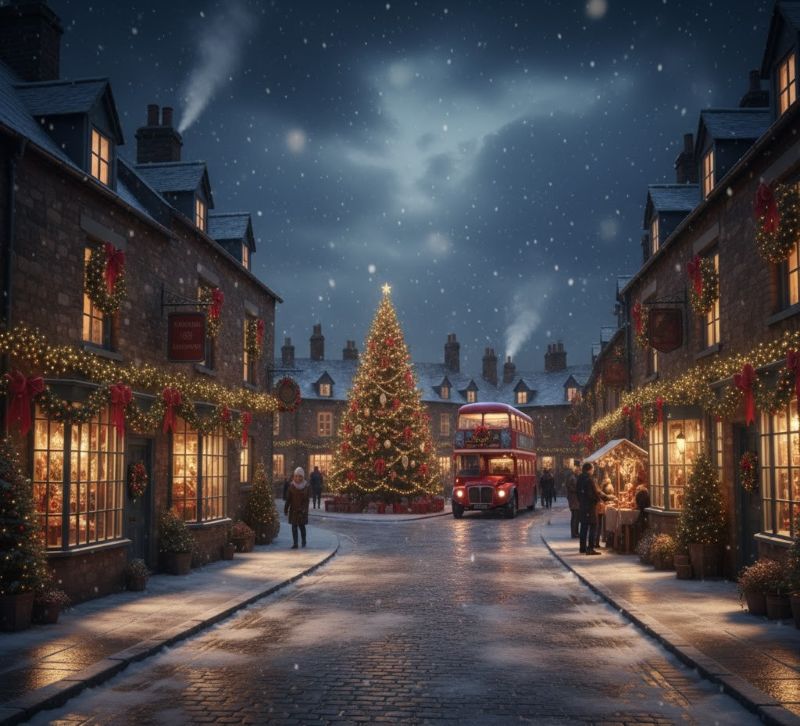Published on
November 4, 2025

In Durham, the arrival of winter turns the ancient North East city into a glowing celebration of culture, heritage, and travel inspiration. The Durham Christmas Festival has evolved into one of the UK’s top five festive destinations, admired across Europe and beyond. With cobbled lanes glittering under fairy lights and the striking silhouettes of Durham Cathedral and Durham Castle rising against the skyline, this UNESCO World Heritage treasure invites travelers into a world where history and festivity coexist.
Observers said that this festival had become much more than just a Christmas market—it had turned into a movement in experiential travel, emphasizing authenticity, community, and craftsmanship over mere spectacle. Through its handcrafted gifts, carol-filled courtyards, and the scent of mulled wine in the crisp winter air, Durham was believed to have redefined how the world experiences festive tourism.
A Legacy That Shapes the Future of Travel
It was widely believed that the Durham Christmas Festival was setting an example for cities worldwide, showing how smaller heritage destinations could influence the global tourism map. As the celebration prepared to unfold from December 5 to 7, the historic city stood ready to welcome travelers from multiple continents—each seeking not just an event, but a meaningful cultural immersion.
Analysts suggested that Durham’s success mirrored a broader global shift toward cultural and emotional tourism. More travelers now seemed to favor experiential destinations that offered authenticity rather than extravagance. This trend encouraged deeper engagement with local traditions—interacting with artisans, tasting regional delicacies, and joining in community-led festivities that encouraged shared joy.
This shift, they believed, symbolized a transformation in sustainable tourism, proving that heritage-rich destinations could achieve international prominence not through size, but through sincerity.
Global Significance: The Power of Small Destinations
Experts often compared Durham’s understated charm with grand European markets such as Vienna, Prague, or Strasbourg, and observed that while those cities dazzled through magnificence, Durham’s strength lay in authentic human warmth.
With Durham Cathedral and Durham Castle standing as timeless guardians, visitors described their experience as walking into a living fairy tale. The mix of medieval architecture, festive lights, and intimate community gatherings formed an atmosphere that few other places could rival.
Observers claimed that Durham had quietly built an identity that transcended geography—it had become a symbol of connection, where travelers found meaning beyond consumerism. Many who journeyed there regarded it not as a visit but as an emotional pilgrimage, where the spirit of Christmas met the endurance of culture.
The Essence of Sustainable Festivity
The increasing admiration for the Durham Christmas Festival was seen as a powerful lesson in sustainability. Experts noted that Durham’s approach showed the world how tourism could coexist with cultural preservation. Unlike over-commercialized cities dominated by imported products, Durham’s markets highlighted local artisans, handmade goods, and regional cuisine.
Every stall told a story—of craftsmanship, community, and regional pride. The entire experience fostered eco-conscious travel, promoting what is often called “slow tourism”—an appreciation of pace, purpose, and people.
Analysts summarized Durham’s sustainable travel model with three defining principles:
- Economic sustainability: Visitors’ spending directly supported independent artisans and local producers.
- Cultural preservation: The event celebrated regional artistry and revived ancient craft traditions.
- Environmental awareness: With reduced waste and minimal imports, Durham promoted a lower carbon footprint.
This conscious alignment between heritage and modern ethics elevated Durham from being a festival destination to a global model for responsible travel—a path more travelers now wish to follow.
Palace Green: The Heartbeat of Durham’s Festive Magic
At the festival’s core lies Palace Green, a breathtaking open space cradled between the towering Durham Cathedral and Durham Castle. This setting, described as one of Britain’s most enchanting festive backdrops, became the centerpiece of celebration.
The Craft & Producers’ Marquee dominated Palace Green, offering over 250 independent traders displaying their artistry—handwoven textiles, wooden ornaments, ceramics, and seasonal treats. Visitors were surrounded by Gothic towers, historic walls, and flickering lights that made every moment feel cinematic.
As they wandered into the Market Place and indoor festive halls, travelers found warmth and nostalgia at every corner. The seamless transition from outdoor festivity to candlelit coziness created an immersive environment that celebrated the spirit of English Christmas in its purest form.
Music, Lights, and the Spirit of Celebration
The festival’s beauty went far beyond its visuals—it pulsed with emotion. The music, light, and laughter united to turn Durham into a symphony of joy. From carol performances echoing through medieval alleys to street choirs beneath glowing lanterns, every sound seemed to dance with history.
One of the most heartwarming traditions, the Children’s Lantern Parade, stood out as a symbol of hope and unity. Hundreds of children carrying handcrafted lanterns illuminated Durham’s narrow streets before converging outside Durham Cathedral. The sight of lights shimmering against ancient stone walls was often described as breathtaking and profoundly moving.
Unlike the grand parades of larger capitals, Durham’s lantern procession carried quiet intimacy and heartfelt emotion—a reflection of a community-driven celebration that valued connection over grandeur.
Durham’s Distinct Identity Amid Festive Destinations
Observers often remarked that Durham’s Christmas Festival maintained an extraordinary balance between serenity and festivity. In contrast to the crowded avenues of London or Edinburgh, Durham offered travelers tranquil enchantment.
Visitors were not merely bystanders—they became participants in a living tradition. The aroma of cinnamon and roasted chestnuts, the gentle hum of carols, and the soft glow of lantern-lit alleys made every moment tangible.
Many travelers said that time seemed to pause in Durham, letting them fully absorb the surroundings. The medieval streets, coupled with the warm community spirit, gave the city an emotional depth rarely found in large urban centers.
This calm beauty, intertwined with historical richness, established Durham as a sanctuary for travelers seeking authentic connection over commercial intensity.
Craftsmanship and Community: The Soul of Durham’s Celebration
The Durham Christmas Festival was seen as an embodiment of the city’s cultural heartbeat. From Palace Green to the Market Place, the celebration transformed Durham’s medieval blueprint into a festive canvas alive with color, sound, and scent.
At its foundation lay the value of craftsmanship—a trait that defined the city’s artistic soul for generations. Local creators presented pottery, knitted garments, wooden toys, and culinary delights such as locally sourced puddings and spiced beverages.
Every handmade object represented not just creativity but also continuity—a connection between past and present. The artisans’ commitment mirrored Durham’s reputation as a guardian of heritage and a promoter of cultural resilience.
This devotion to artistry turned the festival into something more profound than commerce—it became a celebration of identity, a living exhibition of how tradition thrives in the modern world.
A Catalyst for Regional Tourism Growth
Durham’s recognition as one of the UK’s top five Christmas markets marked a defining milestone for the North East region. Tourism experts believed this acclaim would generate far-reaching effects—not only boosting visitor numbers but also revitalizing nearby towns, villages, and local industries.
The increase in tourist arrivals was expected to strengthen hospitality, transportation, and heritage tourism sectors across County Durham and surrounding areas. Beyond seasonal peaks, the festival’s prestige could transform Durham into a year-round travel destination, encouraging longer stays and repeat visits.
The surrounding River Wear, Durham Dales, and coastal heritage sites were predicted to attract renewed interest from international travelers drawn by the festival’s fame.
In essence, Durham’s example proved how authentic cultural experiences could drive sustainable economic growth without sacrificing heritage integrity.
A Global Blueprint for Future Festive Travel
International observers suggested that Durham’s model might redefine how smaller historic cities plan their own festive events. By harmonizing local character with global appeal, Durham demonstrated that intimacy could triumph over extravagance.
This fusion of English tradition with universal hospitality helped the city cross borders emotionally, drawing visitors from Europe, Asia, and North America alike. Travelers came not only to see but to feel—to experience human connection, craftsmanship, and serenity.
Durham’s emphasis on meaning over materialism offered a new travel philosophy, one that placed emotion, environment, and engagement at its heart. It redefined luxury as authenticity—a form of richness that no commercial spectacle could replicate.
A Living Bridge Between Past and Present
Those who visited Durham often said that walking through its festival felt like traversing centuries. Every archway, courtyard, and market stall whispered stories of faith, art, and endurance.
The preservation of architecture and the celebration of tradition merged into a living narrative that allowed travelers to experience history firsthand. Unlike static museums, Durham offered an interactive connection—one that invited visitors to become part of the story rather than distant observers.
This fusion of heritage and hospitality showcased how a city could remain timeless yet relevant. For global travelers, Durham symbolized an evolving truth: that emotional connection is the future currency of travel.
The Broader Influence on Global Tourism
Experts forecasted that Durham’s rising influence might inspire cities across Europe, Asia, and beyond to rethink their approach to festive tourism. Heritage destinations might increasingly focus on storytelling, local participation, and sustainability as key pillars of visitor experience.
Reports indicated that other regions were already studying Durham’s methods—integrating cultural authenticity into seasonal festivals to achieve both emotional and environmental impact.
The trend, they believed, pointed to a profound change in global tourism: in an age of digital overload, travelers are rediscovering the value of human touch, community connection, and cultural sincerity. Durham’s success, therefore, was not just local—it was symbolic of a global awakening in travel philosophy.
The Enduring Magic of Durham’s Festive Spirit
As December 5–7 neared, anticipation shimmered across Durham’s cobblestone streets. Decorations lit up shopfronts, choirs rehearsed melodies, and artisans polished their creations in preparation for the influx of travelers.
Yet beyond the lights and laughter, the true triumph of Durham’s festival lay in its heart—the ability to preserve authenticity while embracing the world. It reminded the global travel industry that success does not depend on scale but on soul.
Through its craftsmanship, community warmth, and cultural depth, Durham has offered the world a timeless message: the future of travel belongs to destinations that stay true to their essence while welcoming all.
For every traveler seeking wonder not in extravagance but in emotion, Durham now stands as a beacon of festive inspiration—a city that proved the most meaningful journeys are those that touch the heart, not just the itinerary.









